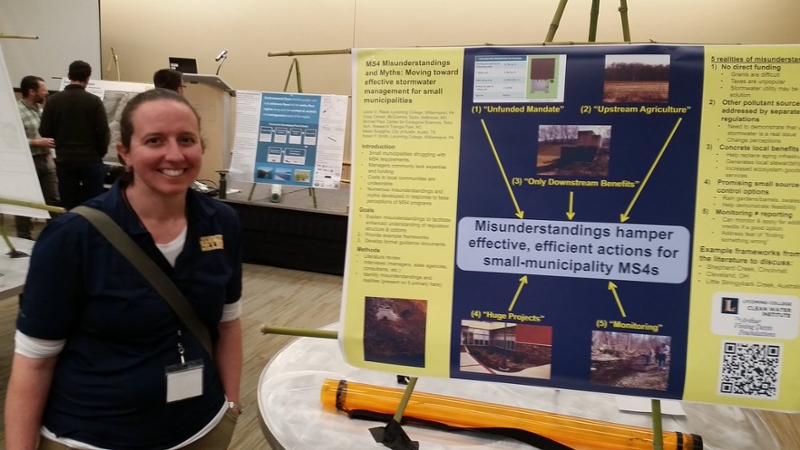
Leslie Rieck with her poster at SUSE.
Download Image: Web
Robert F. Smith, Ph.D., assistant professor of biology at Lycoming College and research associate with the College’s Clean Water Institute (CWI), was awarded a $25,550 grant from the National Science Foundation (NSF) to support of the 5th Symposium on Urbanization and Stream Ecology (SUSE5), for which he is a co-organizer and a member of the advisory board.
SUSE (www.urbanstreamecology.org) is an interdisciplinary meeting held every three to five years that aims to further the scientific study of stream ecosystems in urban landscapes. The theme for SUSE5, which occurred in February, was “Moving the bar on multidisciplinary solutions to wicked urban stream problems.” The symposium sought to generate new approaches to overcoming barriers to effective stream management and restoration that require expertise in natural science, social science, the humanities, communication, engineering, landscape architecture, and education.
Grant dollars were used to provide travel stipends to people from disciplines less commonly represented at the symposia, such as social scientists, landscape planners, and engineers, as well as people with personal backgrounds often underrepresented in stream ecology. SUSE5 employed a novel structure for a professional meeting that enabled participants to work in professionally diverse teams to tackle complex real-world problems through in-depth case studies. The NSF grant also helped to fund other meeting expenses and publication costs.
At the symposium, Smith presented his poster, “GIS-based prioritization system for small municipality MS4 compliance projects,” which discussed a GIS-based prioritization tool for assisting a coalition of municipalities in Lycoming County, Pa., in identifying suitable locations for stormwater projects. Lycoming College biology and math double major Bailey Schwenk ’21 (Hughesville, Pa.), co-authored the poster and will continue moving the research forward as he begins to focus on his senior project.
Leslie Rieck, Ph.D., postdoctoral scholar with the College’s CWI, also presented research at the event. Her poster, “MS4 Misunderstandings and Myths: Moving toward effective stormwater management for small municipalities,” summarized common misunderstandings concerning municipal separate storm sewer (MS4) requirements and offered real-world examples of efficient, effective frameworks for municipalities to satisfy MS4 regulations.
“The meeting was an intense and amazing three days of interdisciplinary science,” said Smith. “Everyone who participated learned about urban streams and about how to create effective solutions to managing these systems within the context of the urban communities the streams flow through. The most important outcome of the meeting was demonstrating a path forward to developing approaches to conservation that integrate ecological improvement, social justice, and improved community capacity.”
CWI’s role as a minor sponsor of the February event, coupled with Smith’s and Rieck’s involvement, further demonstrates its capacity to work at the forefront of applied stream ecology. This event aligns with the CWI’s current project developing a college-community stormwater partnership supported by a grant from the Arthur Vining Davis Foundations.
In addition to the NSF grant, the Washington Biologists’ Field Club, a nonprofit that promotes the study of biology in the Washington, D.C., area, recently awarded a $2991 grant to Smith to support a project entitled, “Effect of weather on activity and ecology of adult stream insects.” The grant supports a project, currently led by undergraduate biology major Jenna Tasker ’22 (Northumberland, Pa.), examining the effect of daily weather on adult stream stonefly (Plecoptera) activity.
The CWI provides a gateway to the natural resource heritage of North Central Pennsylvania. Focused on the West Branch of the Susquehanna River and its tributaries, CWI provides opportunities for Lycoming College students to gain research and internship experience, and to educate communities about the health of our waterways.